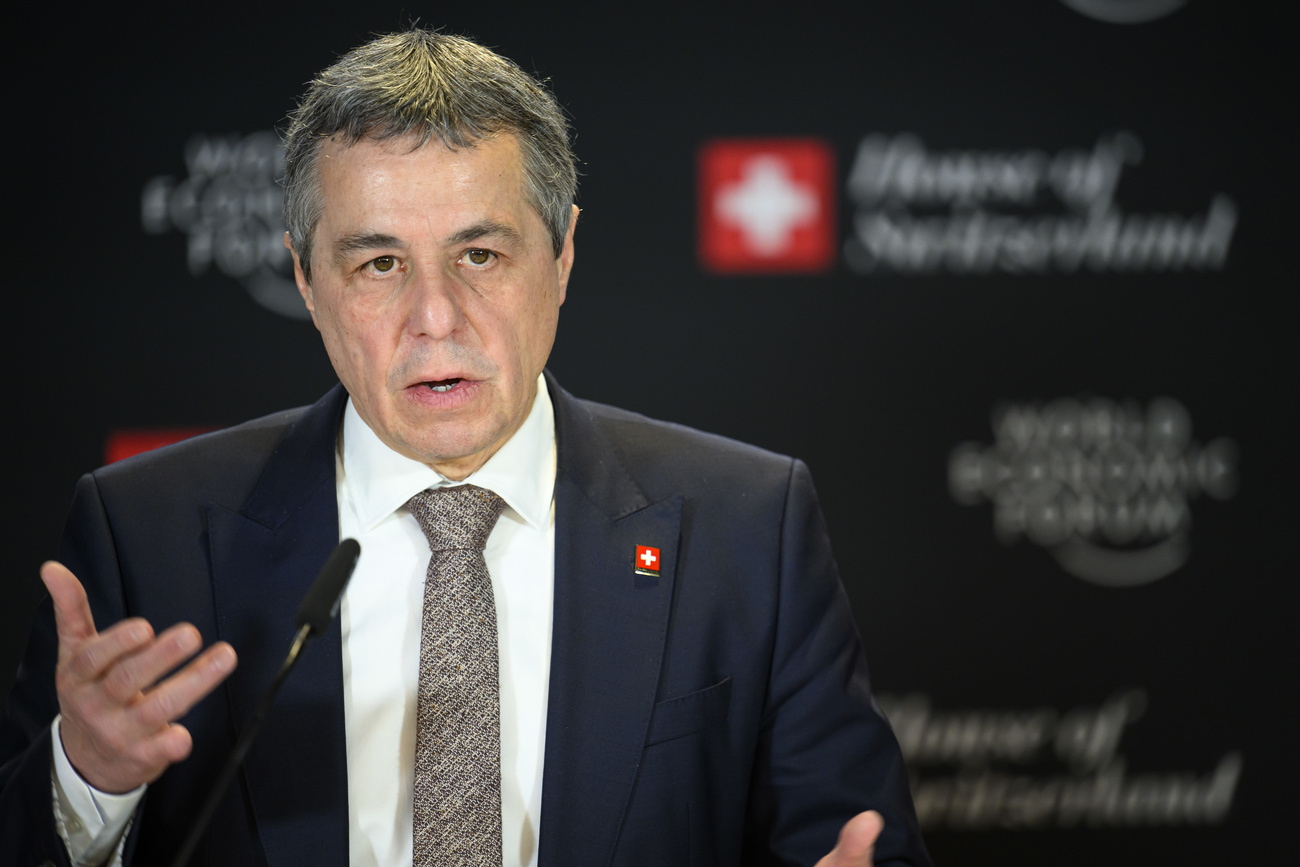Uncertainty surrounds planned Ukraine peace summit

Swiss Foreign Minister Ignazio Cassis admits many uncertainties surround a planned peace summit aimed to help bring an end to Ukraine’s ongoing war with Russia.
“The contours are not yet clear,” the Swiss minister told reporters at the World Economic Forum (WEF) annual meeting on Wednesday. “It all depends on how the influential countries want to be involved,” he said referring to Moscow’s participation.
Asked whether such a meeting was realistic in the next few months, Cassis said the military situation would have to be “ripe” for such a meeting to be organised.
On Monday Swiss President Viola Amherd announced, during a visit by Ukrainian President Volodymyr Zelensky to Bern, that Switzerland had offered to organise a peace summit.
“We have agreed that we will examine the details of the next steps in depth to ensure that the peace process is a success,” Amherd said during a joint press conference with Zelensky.
+ Ukraine and Switzerland urge countries to support peace plan in Davos
The two presidents said the Ukrainian and Swiss teams would begin preparations for the summit in Switzerland. No details were provided about when or how such a summit could take place, and Russia hasn’t been involved in the process.
+ Switzerland plans to organise Ukraine peace summit
Once again Cassis reiterated on the sidelines of the WEF meeting that there would be no peace conference “bearing this name and leading to a cessation of hostilities without Russia”.
Despite a cooling of relations with Moscow following sanctions, contacts with are continuing, said the Swiss minister. He stressed that BRICS states, an informal group of countries comprising Brazil, Russia, India, China, South Africa, Egypt, Ethiopia, Iran and the United Arab Emirates, should be widely represented at any future peace summit.
+ From Amherd to Zelensky: 48 hectic hours in the life of the Swiss president
Cassis met a Brazilian official on Sunday in Davos on the sidelines of the meeting of national security advisers on the Ukrainian peace plan. The Swiss minister will travel to China and India in February to try to sound them out about a future peace conference.
Another uncertainty surrounds where such a peace summit will be held. On Tuesday, a government source told the Keystone-SDA news agency that Geneva had already been chosen. Cassis denied this on Wednesday: “No decision has yet been taken.”
+ Ukraine peace summit to take place in Geneva
The only certainty, in his view, was that the United Nations Security Council, of which Switzerland is a non-permanent member, would not resolve the conflict in Ukraine.
Cassis expressed his admiration for the Ukrainian president, who is in “good health” and who continues to be committed after two years of war, he declared.
Zelensky’s speech to the WEF on Tuesday was “important”, “clear” and “emotional”, he said. It was a reminder to Westerners “of what we are talking about”.
Iran and Middle East
Ukraine is not the only situation of concern on the Swiss foreign minister’s radar. On Wednesday, he urged his Iranian counterpart, Hossein Amir-Abdollahian, to use “all his power” to avoid any escalation in the situation in the Middle East. He also shared his concerned about the tensions between Tehran and Iraqi Kurdistan.
The Iranian minister outlined his “intention” to work towards avoiding any escalation, Cassis told reporters.
Iranian-backed Houthi militants in Yemen have stepped up attacks on vessels in the Red Sea, impacting a shipping route vital to East-West trade. The Houthis say they are acting in solidarity with the Palestinians in Gaza and have threatened to expand the attacks to include US ships as the war between Israel and the militant Hamas group rages for a fourth month.
US and British forces responded last week by carrying out dozens of air and sea strikes on Houthi targets in Yemen.
“Iran’s official position is that the war in the Middle East must stop,” said Cassis, who is due to meet Israeli President Isaac Herzog on Thursday. The longer the conflict goes on, the more difficult it becomes to protect civilians, he added.
Next week the Swiss official is due to take part in a ministerial discussion on the Middle East at the UN Security Council in New York.
This news story has been written and carefully fact-checked by an external editorial team. At SWI swissinfo.ch we select the most relevant news for an international audience and use automatic translation tools such as DeepL to translate it into English. Providing you with automatically translated news gives us the time to write more in-depth articles. You can find them here.
If you want to know more about how we work, have a look here, and if you have feedback on this news story please write to english@swissinfo.ch.

In compliance with the JTI standards
More: SWI swissinfo.ch certified by the Journalism Trust Initiative
You can find an overview of ongoing debates with our journalists here. Please join us!
If you want to start a conversation about a topic raised in this article or want to report factual errors, email us at english@swissinfo.ch.